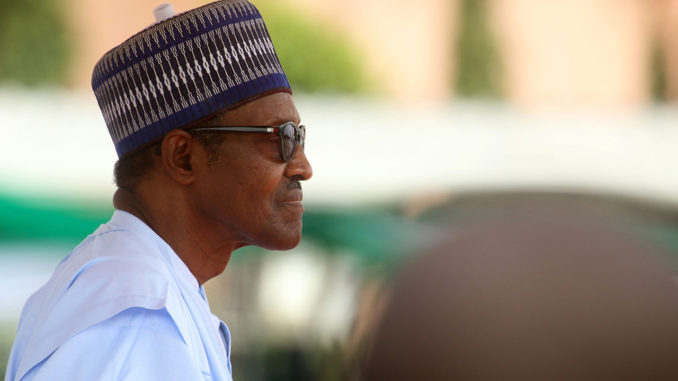
President Muhammadu Buhari has advised Nigerian farmers to increase their food production as Nigeria has ‘no money’ for food importation.
Even before the coronavirus pandemic, Nigeria has restricted food importation as the country strived to produce a lot of the food it consumes. The country also shut its borders with neighbouring countries, largely to prevent the importation and smuggling of items such as rice, poultry and petrol. The borders are still shut but were also closed to human traffic following the coronavirus pandemic, although smuggling and other illegal activities still go on with the connivance of corrupt security officials.
Mr Buhari gave his advice to the farmers while addressing journalists after observing this year’s ‘Eid’ prayer at the Presidential Villa in Abuja, on Sunday.
PREMIUM TIMES earlier reported how the president observed the Islamic ‘Eid’ prayer to mark the end of Ramadan fast privately with his family; based on the nationwide restrictions due to the coronavirus pandemic.
“I wish them the best of luck…I hope the rainy season will be bountiful, to get a lot of food.
“I wish the farmers could go and stay in their farms so that we can produce what we need sufficiently so that we don’t have to import. In any case, we don’t have money to import so we must produce what we have to eat,” he said.
Economy In Trouble
Mr Buhari’s reference to the economy is not unrelated to what Nigeria’s finance minister, Zainab Ahmed, said last week that the country’s economy would definitely go into recession soon.
Nigeria is one of the countries hardest hit by the impact of the coronavirus pandemic.
A large part of its budget is funded by oil revenue which makes up over 90 per cent of its export. The sharp drop in oil prices globally has meant reduced income for the West African country.
Nigeria also closed a large part of her economy to prevent the spread of the coronavirus. All its airports are still closed except for essential flights while businesses are only partially reopened.
Reduce Impact on Farmers
This newspaper reported how Mr Buhari while addressing Nigerians last month directed that officials should ensure the impact of the coronavirus pandemic is minimised on farmers.
He ordered the Minister of Agriculture and Rural Development, Sabo Nanono, and other key players in the sector to join the already existing 12-member Presidential Task Force (PTF) as a strategy to minimise the impact of COVID-19 on farmers.
The president directed the ministers to develop a comprehensive policy for a ‘Nigerian Economy functioning with COVID-19.’
The government has since said it has begun the process of ensuring agricultural products have easy access across the states.
Also, Mr Nanono inaugurated the joint technical task team on emergency response to COVID-19 to ease the movement of agricultural inputs across Nigeria.
Since the Buhari administration assumed office, the government has put in place several mechanisms to assist farmers with resources, farm inputs, seedlings, and other materials. The government’s Anchor Borrowers Programme, managed by the Central Bank of Nigeria, is largely responsible for Nigeria’s massive increase in local rice production.
On Sunday, Mr Buhari said he hopes the rain season “would be bountiful”, so a lot of food will be produced this year.
READ ALSO: YOU’VE NO RIGHT TO ORDER BUHARI AROUND, FEMI ADESINA TELLS NIGERIANS
Although agriculture contributes a lot to Nigeria’s Gross Domestic Product, with millions of people involved in it, a lot of the farming is still artisanal with many of the farmers relying on rainwater for irrigation of their fields.
Obey COVID-19 rules
On Sunday, Mr Buhari also advised Nigerians to strictly adhere to guidelines and measures put in place against the spread of the deadly virus in the country.
He said the pandemic had reduced both developed and developing nations to “the same level.”
“You can see that COVID-19 has reduced us; when I say us I mean both developed and developing countries, to the same level. In fact, we have less casualties than they have,” he said.
“So, it’s a very frightening development and I advise Nigerians to be very careful and take the advice of the Ministry of Health. Ministers of Health have been doing very well, speaking and educating the citizens on the deadly virus,” he added.
Nigeria has so far tested 43,328 persons since the beginning of the pandemic.
A breakdown of all the confirmed cases so far shows that out of the total 7,526 confirmed cases, there are 5,131 active cases, 2,174 have recovered and have been discharged, and 221 deaths have been reported.
A breakdown of the 7,526 confirmed cases shows that Lagos State has so far reported 3,357 cases, followed by Kano – 883, FCT – 468, Katsina – 308, Borno – 250, Jigawa – 241,Bauchi – 232, Oyo – 233, Ogun – 219, Kaduna – 184, Gombe – 145, Edo – 172, Sokoto – 116, Rivers – 89, Zamfara – 76, Kwara – 75, Plateau – 77, Yobe – 47, Osun – 42, Nasarawa – 38, Kebbi – 32, Delta – 31, Adamawa – 27, Niger – 26, Ondo – 23, Ebonyi – 22, Akwa Ibom – 21, Ekiti – 20, Taraba – 18, Enugu – 18 Bayelsa – 8, Imo – 7, Abia – 7, Anambra – 8, and Benue – 5.
END

Be the first to comment